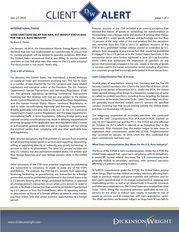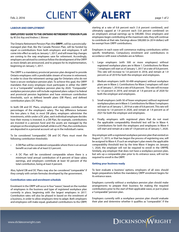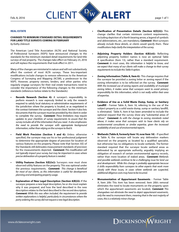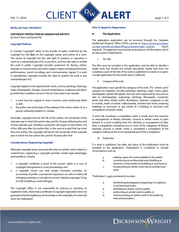Description
FRANCHISE&DISTRIBUTIONNEWS
of franchise employees. The bills also modified the definition of
the term “employer” in the Michigan Employment Security Act, the
Workforce Opportunity Wage Act, the Michigan Occupational Safety
& Health Act, and the Payment of Wages and Fringe Benefits Act.
These amendments include a provision in the Michigan Worker’s
Disability Compensation Act excluding joint employer status unless
“(t)he franchisee and franchisor share in the determination of or
codetermine the matters governing the essential terms and conditions
of the employee’s employment” and “. . .
both directly and immediately control matters relating to the employment relationship, such as hiring, firing, discipline, supervision, and direction.” The amendments to the MFIL and the Worker’s Compensation Act were effective on March 22, 2016. The effective date for the other statutory changes is May 23, 2016. Things to do now: 1. Michigan franchisors should consider amending their franchise agreements to clearly provide that the franchisee is the sole employer of the workers that the franchisee pays or to whom they provide benefits to the maximum extent permitted under Michigan law. 2. All franchisors should review their franchise agreements and consider removing any provisions that are unnecessary or that may result in a finding of indirect control over franchisee employees. This is particularly important with respect to the employment relationship or the day to day activities of the franchise employees. 3. Franchisors should also review their operations manuals and documents that they provide to franchisees to remove any “mandatory” compliance language for issues that are not essential to the business model.
Franchisors should also avoid directing franchisees or franchise employees or engaging in any course of dealing that could support a finding that the franchisor has “indirect” control over the franchisee’s employees. 4. Franchisors should consult legal counsel familiar with the intersection of employment law and franchise operations to assist with document review and protective measures in order to limit liability. HOW ENFORCEABLE ARE YOUR NON-COMPETITION COVENANTS IN CANADA? by Andrae Marrocco Most franchise agreements include a non-competition covenant preventing a franchisee from competing with the franchisor during the term, and in many cases after the term of the agreement. Ontario courts have generally enforced non-competition covenants, acknowledging the potential harm to a franchisor’s goodwill, and the integrity of the franchisor’s system, in circumstances where noncompetition covenants that are reasonable in scope and time are not enforced. page 4 of 4 Interestingly, the case of MEDIchair LP v DME Medequip Inc. provides an example of circumstances under which an Ontario court will not enforce a non-competition covenant. The Ontario Court of Appeal refused to enforce the non-competition covenant on the grounds that the franchisor had no intention of opening another franchise store in the protected geographic area.
The court cautioned that non-competition covenants can serve only to protect “the legitimate interest of the franchisor” and cannot extend beyond that. The typical approach and considerations were not warranted in circumstances where the franchisor did not intend to operate in the relevant region post-termination – and thereby essentially concluding that the franchisor has no legitimate interest to protect. .
both directly and immediately control matters relating to the employment relationship, such as hiring, firing, discipline, supervision, and direction.” The amendments to the MFIL and the Worker’s Compensation Act were effective on March 22, 2016. The effective date for the other statutory changes is May 23, 2016. Things to do now: 1. Michigan franchisors should consider amending their franchise agreements to clearly provide that the franchisee is the sole employer of the workers that the franchisee pays or to whom they provide benefits to the maximum extent permitted under Michigan law. 2. All franchisors should review their franchise agreements and consider removing any provisions that are unnecessary or that may result in a finding of indirect control over franchisee employees. This is particularly important with respect to the employment relationship or the day to day activities of the franchise employees. 3. Franchisors should also review their operations manuals and documents that they provide to franchisees to remove any “mandatory” compliance language for issues that are not essential to the business model.
Franchisors should also avoid directing franchisees or franchise employees or engaging in any course of dealing that could support a finding that the franchisor has “indirect” control over the franchisee’s employees. 4. Franchisors should consult legal counsel familiar with the intersection of employment law and franchise operations to assist with document review and protective measures in order to limit liability. HOW ENFORCEABLE ARE YOUR NON-COMPETITION COVENANTS IN CANADA? by Andrae Marrocco Most franchise agreements include a non-competition covenant preventing a franchisee from competing with the franchisor during the term, and in many cases after the term of the agreement. Ontario courts have generally enforced non-competition covenants, acknowledging the potential harm to a franchisor’s goodwill, and the integrity of the franchisor’s system, in circumstances where noncompetition covenants that are reasonable in scope and time are not enforced. page 4 of 4 Interestingly, the case of MEDIchair LP v DME Medequip Inc. provides an example of circumstances under which an Ontario court will not enforce a non-competition covenant. The Ontario Court of Appeal refused to enforce the non-competition covenant on the grounds that the franchisor had no intention of opening another franchise store in the protected geographic area.
The court cautioned that non-competition covenants can serve only to protect “the legitimate interest of the franchisor” and cannot extend beyond that. The typical approach and considerations were not warranted in circumstances where the franchisor did not intend to operate in the relevant region post-termination – and thereby essentially concluding that the franchisor has no legitimate interest to protect. .













